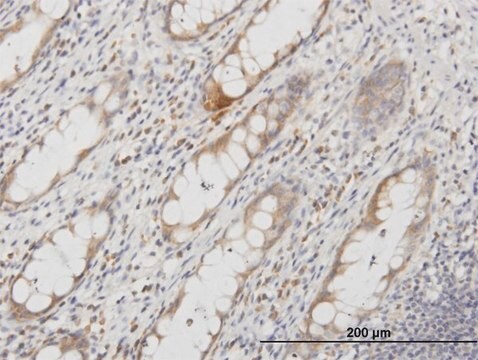A6011
Acetazolamide
≥99%, powder
Sinónimos:
5-Acetamido-1,3,4-thiadiazole-2-sulfonamide, N-(5-Sulfamoyl-1,3,4-thiadiazol-2-yl)acetamide, N-(5-[Aminosulfonyl]-1,3,4-thiadiazol-2-yl)acetamide
About This Item
Productos recomendados
biological source
synthetic
assay
≥99%
form
powder
pKa
7.2
mp
258-259 °C
solubility
1 M NH4OH: 50 mg/mL
DMSO: soluble
methanol and ethanol: slightly soluble
SMILES string
CC(=O)Nc1nnc(s1)S(N)(=O)=O
InChI
1S/C4H6N4O3S2/c1-2(9)6-3-7-8-4(12-3)13(5,10)11/h1H3,(H2,5,10,11)(H,6,7,9)
InChI key
BZKPWHYZMXOIDC-UHFFFAOYSA-N
Gene Information
human ... CA1(759) , CA12(771) , CA14(23632) , CA2(760) , CA3(761) , CA4(762) , CA5A(763) , CA5B(11238) , CA9(768)
mouse ... Car13(71934) , Car5a(12352)
rat ... Car2(54231) , Car4(29242)
¿Está buscando productos similares? Visita Guía de comparación de productos
Application
- to study its protective effect on steatotic liver grafts against cold ischemia reperfusion injury{49)
- to determine its ability to bind isolated porcine retinal pigment epithelium (RPE) melanin by cassette dosing and rapid equilibrium dialysis inserts
- to validate the in vitro gastrulation model of P19C5 stem cells for developmental toxicity screening assays
- to study its inhibitory effect on melanogenesis through enzyme kinetic, in vitro, in vivo and in silico analyses in zebrafish and in A375 human melanoma cells
Biochem/physiol Actions
signalword
Warning
hcodes
Hazard Classifications
Eye Irrit. 2 - Skin Irrit. 2
Storage Class
11 - Combustible Solids
wgk_germany
WGK 3
flash_point_f
Not applicable
flash_point_c
Not applicable
ppe
dust mask type N95 (US), Eyeshields, Gloves
Certificados de análisis (COA)
Busque Certificados de análisis (COA) introduciendo el número de lote del producto. Los números de lote se encuentran en la etiqueta del producto después de las palabras «Lot» o «Batch»
¿Ya tiene este producto?
Encuentre la documentación para los productos que ha comprado recientemente en la Biblioteca de documentos.
Los clientes también vieron
Nuestro equipo de científicos tiene experiencia en todas las áreas de investigación: Ciencias de la vida, Ciencia de los materiales, Síntesis química, Cromatografía, Analítica y muchas otras.
Póngase en contacto con el Servicio técnico










